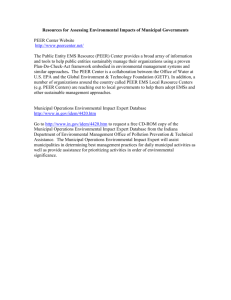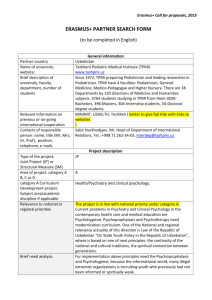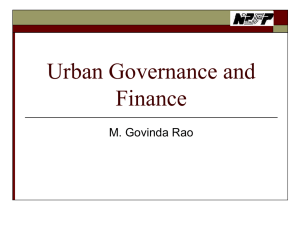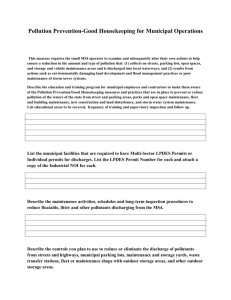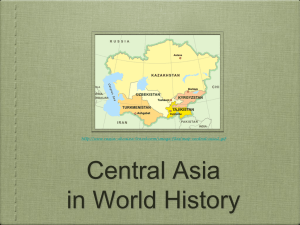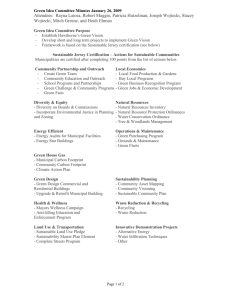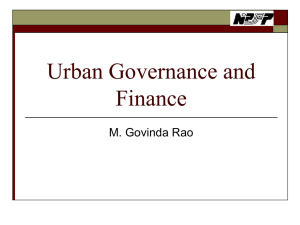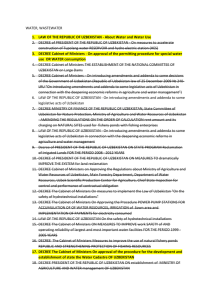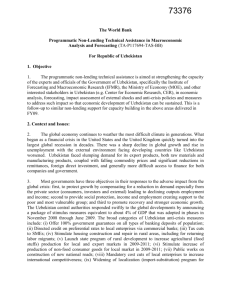Brief Notes on International workshop on Municipal Governance and
advertisement
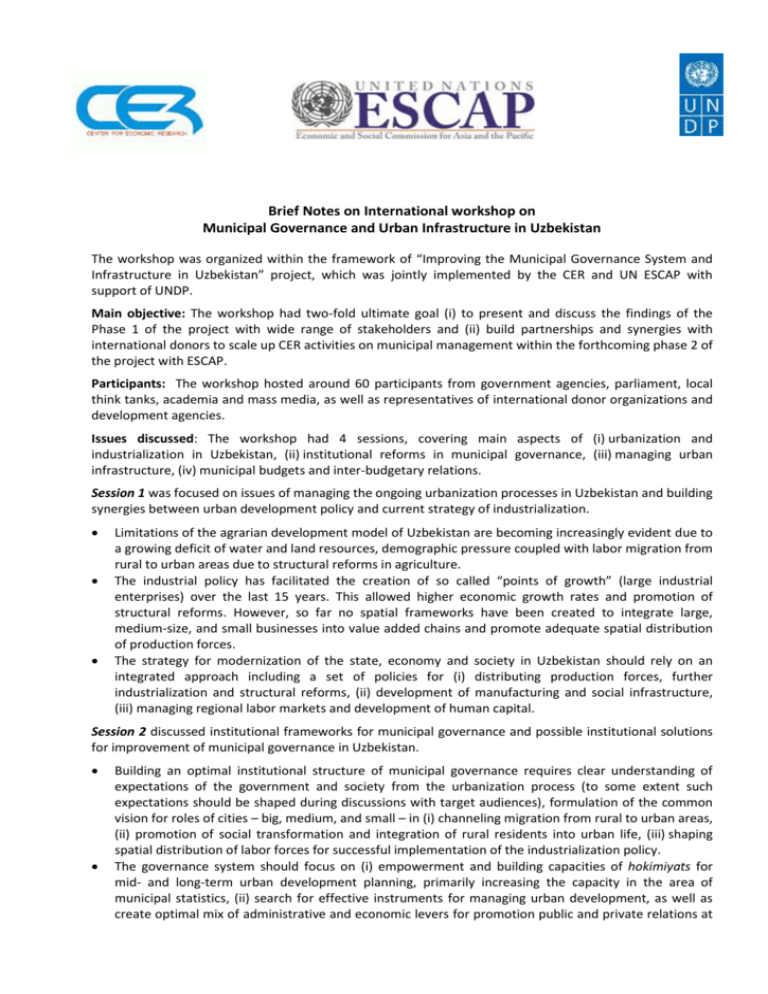
Brief Notes on International workshop on Municipal Governance and Urban Infrastructure in Uzbekistan The workshop was organized within the framework of “Improving the Municipal Governance System and Infrastructure in Uzbekistan” project, which was jointly implemented by the CER and UN ESCAP with support of UNDP. Main objective: The workshop had two-fold ultimate goal (i) to present and discuss the findings of the Phase 1 of the project with wide range of stakeholders and (ii) build partnerships and synergies with international donors to scale up CER activities on municipal management within the forthcoming phase 2 of the project with ESCAP. Participants: The workshop hosted around 60 participants from government agencies, parliament, local think tanks, academia and mass media, as well as representatives of international donor organizations and development agencies. Issues discussed: The workshop had 4 sessions, covering main aspects of (i) urbanization and industrialization in Uzbekistan, (ii) institutional reforms in municipal governance, (iii) managing urban infrastructure, (iv) municipal budgets and inter-budgetary relations. Session 1 was focused on issues of managing the ongoing urbanization processes in Uzbekistan and building synergies between urban development policy and current strategy of industrialization. Limitations of the agrarian development model of Uzbekistan are becoming increasingly evident due to a growing deficit of water and land resources, demographic pressure coupled with labor migration from rural to urban areas due to structural reforms in agriculture. The industrial policy has facilitated the creation of so called “points of growth” (large industrial enterprises) over the last 15 years. This allowed higher economic growth rates and promotion of structural reforms. However, so far no spatial frameworks have been created to integrate large, medium-size, and small businesses into value added chains and promote adequate spatial distribution of production forces. The strategy for modernization of the state, economy and society in Uzbekistan should rely on an integrated approach including a set of policies for (i) distributing production forces, further industrialization and structural reforms, (ii) development of manufacturing and social infrastructure, (iii) managing regional labor markets and development of human capital. Session 2 discussed institutional frameworks for municipal governance and possible institutional solutions for improvement of municipal governance in Uzbekistan. Building an optimal institutional structure of municipal governance requires clear understanding of expectations of the government and society from the urbanization process (to some extent such expectations should be shaped during discussions with target audiences), formulation of the common vision for roles of cities – big, medium, and small – in (i) channeling migration from rural to urban areas, (ii) promotion of social transformation and integration of rural residents into urban life, (iii) shaping spatial distribution of labor forces for successful implementation of the industrialization policy. The governance system should focus on (i) empowerment and building capacities of hokimiyats for mid- and long-term urban development planning, primarily increasing the capacity in the area of municipal statistics, (ii) search for effective instruments for managing urban development, as well as create optimal mix of administrative and economic levers for promotion public and private relations at the local level. Nevertheless, even with greater autonomy of municipalities, there should be room for central government to control performance of local authorities and coordinate local development policies. In the context of urbanization, Uzbekistan should ensure a balance between improvement of the engineering/utility infrastructure and the social infrastructure thus ensuring favorable living conditions for urban residents. Session 3 discussed issues of the housing sector development and housing policy in the context of expected increase in the pressure on the urban infrastructure. Availability of skilled managers (municipal governance, municipal property, etc.) both within the government sector and in the Home Owners Associations will to a greater extent affect development perspectives of the housing sector in general and enable rehabilitating, modernization and maintaining efficient public utilities sector. Changes in current tariff policy and price setting/regulation mechanisms for utility services will determine financial sustainability of housing and utilities sectors. Tariffs should play a key role in (i) increasing financial sustainability of enterprises in utility sector, including their capacities to invest, (ii) promote saving policies and stimulate consumers to be more proactive in managing communal property. There is a need to create sustainable mechanisms, which will enable Home Owners Associations and utility sector enterprises mobilizing additional financial resources for capital repairs and maintenance, renovation and introduction of energy-efficient technologies, and etc. Session 4 elaborated on the issues of municipal budgets and inter-budgetary relations. Policies on promoting local development, including development of small and medium towns, should extensively rely on improved capacities of local budgets to implement urban infrastructure projects. This requires (i) wider budgetary powers of local governments, especially of municipal governments, (ii) rearrangement of inter-budgetary relations to increase the share of budget expenditures implemented at the discretion of local governments. Financing urban infrastructure in a long-term perspective calls for development of public private partnership. However, currently, neither the government nor the private sector appears to be fully ready for advanced partnership relations. There is a need for improvement of regulatory framework and piloting PPP frameworks in different sectors to create necessary political will and capacities. There is a need for a systemic, holistic approach to addressing urban development challenges. The government committed to invest extensively into improvement of urban water supply and sanitation, energy supply and transport networks. Both state budget and IFIs funds are mobilized to adequately finance infrastructure programs and projects. However, these efforts are rather fragmentary and sector-bound preventing comprehensive urban infrastructure policy. Main conclusions and follow up: The International Workshop for the first time in Uzbekistan raised the issues of urban development in such comprehensive manner. Participants confirmed that the urban development as a whole and municipal management will be a mainstream in Uzbekistan for coming decade since the country is undergoing significant transformations. The project enabled building a broad network around the urban development and primarily development of small and medium sized towns that are home to most urban residents in Uzbekistan. The international workshop facilitated PR and outreach campaign allowing better awareness among target audiences and setting grounds for a broader discussions of urban development issues among experts community and wider public. The project will continue within the framework of phase 2 and in the long run should be focused on formulation and launching of a major regional initiative – a Central Asia Urban Forum. The idea was supported by ESCAP and colleagues from other partner institutions (World Bank, Asian Development Bank, USAID). CER and ESCAP will follow up with all the involved partners to formulate a concept note for discussion of the possible interagency initiative.


